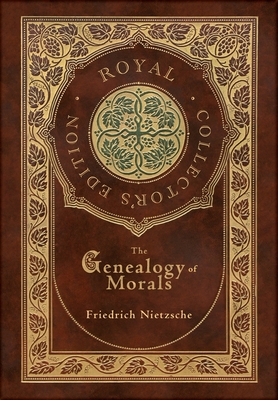The Genealogy of Morals (Royal Collector's Edition) (Case Laminate Hardcover with Jacket)

The Genealogy of Morals (Royal Collector's Edition) (Case Laminate Hardcover with Jacket)
The three interrelated treatises trace episodes in the evolution of moral concepts with a view to confronting moral prejudices, specifically those of Christianity and Judaism. In the first treatise, Nietzsche demonstrates that the two pairs of opposites "good/evil" and "good/bad" have very different origins, and that the word "good" itself came to represent two opposed meanings. The second treatise examines what we call "the conscience" is the end product of a long and painful socio-historical process that began with the need to create a memory in the human animal. In the third treatise, Nietzsche asks the question "What do ascetic ideals mean?"
Some Nietzsche scholars consider The Genealogy of Morals to be a work of sustained brilliance and power as well as his masterpiece. Since its publication, it has influenced many authors and philosophers. Some of the contents and many symbols and metaphors portrayed in The Genealogy of Morals, together with its tripartite structure, seem to be based on and influenced by Heinrich Heine's On the History of Religion and Philosophy in Germany.
This case laminate collector's edition includes a Victorian-inspired dust jacket.
PRP: 330.25 Lei
Acesta este Prețul Recomandat de Producător. Prețul de vânzare al produsului este afișat mai jos.
264.20Lei
264.20Lei
330.25 LeiLivrare in 2-4 saptamani
Descrierea produsului
The three interrelated treatises trace episodes in the evolution of moral concepts with a view to confronting moral prejudices, specifically those of Christianity and Judaism. In the first treatise, Nietzsche demonstrates that the two pairs of opposites "good/evil" and "good/bad" have very different origins, and that the word "good" itself came to represent two opposed meanings. The second treatise examines what we call "the conscience" is the end product of a long and painful socio-historical process that began with the need to create a memory in the human animal. In the third treatise, Nietzsche asks the question "What do ascetic ideals mean?"
Some Nietzsche scholars consider The Genealogy of Morals to be a work of sustained brilliance and power as well as his masterpiece. Since its publication, it has influenced many authors and philosophers. Some of the contents and many symbols and metaphors portrayed in The Genealogy of Morals, together with its tripartite structure, seem to be based on and influenced by Heinrich Heine's On the History of Religion and Philosophy in Germany.
This case laminate collector's edition includes a Victorian-inspired dust jacket.
Detaliile produsului









